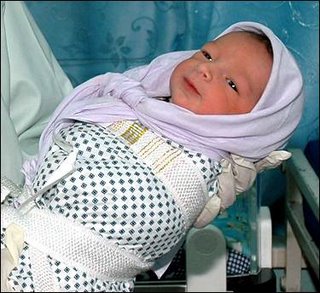Renovated Maternity Hospital Delivers Improved Care
Photo by Air Force Staff Sgt. Benjamin Rojek, CFC-A Public Affairs
KABUL , Afghanistan – A newborn baby at the newly renovated Rabia Balkhi Maternity Hospital prepares for her initial weighing.
By Air Force Staff Sgt. Benjamin Rojek, Combined Forces Command – Afghanistan, Public Affairs OfficeKABUL , Afghanistan – The command surgeon of Combined Forces Command – Afghanistan presented the renovated Rabia Balkhi Maternity Hospital to Afghanistan ’s minister of public health in a ceremony here April 9.The U.S. Departments of Defense and Health and Human Services invested a combined $10 million into renovations, Air Force Col. (Dr.) Donald Thompson said.The renovations and related training programs have already improved the care provided by the Rabia Balkhi, which is Kabul ’s second-busiest maternity hospital, delivering more than 15,000 babies each year.“When we first started, there were three to four maternal deaths per week. Last year, (Rabia Balkhi) had 18 maternal deaths for the entire year,” Thompson said.While those numbers, plus the 50 percent decline in the mortality rate for newborns weighing more than 5.5 pounds, show a positive trend, there are still too many deaths, and that is what continuing programs will attempt to reduce, Thompson said.Finding ways to deliver adequate health care is important to establishing a stable society, said Mohammad Amin Fatimie, the minister of public health.Americans and Afghans should work together on all issues concerning the future of Afghanistan , Fatimie said.“We have common enemies – terrorists and disease,” he said, describing Afghans and Americans as “brothers with the same goal.”The Department of Defense undertook the renovations of the hospital in 2004, investing about $2 million to upgrade the structure, plumbing and electric systems, said Thompson, a Washington, D.C., native. The Defense Department also built a well and installed an above-ground water storage tank so the hospital will have a steady supply of water despite the frequent power outages in Kabul.Although work on the facility is done, the Department of Health and Human Services will continue its work on management and training programs along with Cure International and the International Medical Corps, helping to improve salaries, staff coverage and patient care, Thompson said. The Health and Human Services Department is also participating in developing obstetrics and gynecology training programs at the hospital, and is beginning to fund Cure International’s help with hospital management.Part of the plan for delivering care includes trips by medical professionals into the communities to identify women early in their pregnancies and encourage prenatal visits. This will allow doctors to set up intensive follow-up care for high-risk mothers, Thompson said.Participating organizations are also developing a regional plan to link community health centers to hospitals to improve referrals and continuity of care, Thompson said.With the officials from the Ministry of Public Health, Coalition and other officials are identifying health care needs across Afghanistan, he said.
KABUL , Afghanistan – A newborn baby at the newly renovated Rabia Balkhi Maternity Hospital prepares for her initial weighing.

By Air Force Staff Sgt. Benjamin Rojek, Combined Forces Command – Afghanistan, Public Affairs OfficeKABUL , Afghanistan – The command surgeon of Combined Forces Command – Afghanistan presented the renovated Rabia Balkhi Maternity Hospital to Afghanistan ’s minister of public health in a ceremony here April 9.The U.S. Departments of Defense and Health and Human Services invested a combined $10 million into renovations, Air Force Col. (Dr.) Donald Thompson said.The renovations and related training programs have already improved the care provided by the Rabia Balkhi, which is Kabul ’s second-busiest maternity hospital, delivering more than 15,000 babies each year.“When we first started, there were three to four maternal deaths per week. Last year, (Rabia Balkhi) had 18 maternal deaths for the entire year,” Thompson said.While those numbers, plus the 50 percent decline in the mortality rate for newborns weighing more than 5.5 pounds, show a positive trend, there are still too many deaths, and that is what continuing programs will attempt to reduce, Thompson said.Finding ways to deliver adequate health care is important to establishing a stable society, said Mohammad Amin Fatimie, the minister of public health.Americans and Afghans should work together on all issues concerning the future of Afghanistan , Fatimie said.“We have common enemies – terrorists and disease,” he said, describing Afghans and Americans as “brothers with the same goal.”The Department of Defense undertook the renovations of the hospital in 2004, investing about $2 million to upgrade the structure, plumbing and electric systems, said Thompson, a Washington, D.C., native. The Defense Department also built a well and installed an above-ground water storage tank so the hospital will have a steady supply of water despite the frequent power outages in Kabul.Although work on the facility is done, the Department of Health and Human Services will continue its work on management and training programs along with Cure International and the International Medical Corps, helping to improve salaries, staff coverage and patient care, Thompson said. The Health and Human Services Department is also participating in developing obstetrics and gynecology training programs at the hospital, and is beginning to fund Cure International’s help with hospital management.Part of the plan for delivering care includes trips by medical professionals into the communities to identify women early in their pregnancies and encourage prenatal visits. This will allow doctors to set up intensive follow-up care for high-risk mothers, Thompson said.Participating organizations are also developing a regional plan to link community health centers to hospitals to improve referrals and continuity of care, Thompson said.With the officials from the Ministry of Public Health, Coalition and other officials are identifying health care needs across Afghanistan, he said.




<< Home